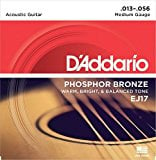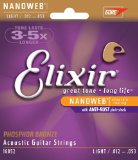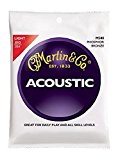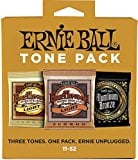The Best Acoustic Guitar Strings
We may also earn commissions on purchases from other retail websites.

Last Updated Jul-26-2018.
Nothing has changed in this chart – the acoustic strings we originally recommended still remain the most popular on the market today! However, we have amended a few things in the article to make it easier to navigate, while we have also added some more answers to your questions.
While it may have taken you some time to find your perfect acoustic guitar – reading reviews, watching videos, trying out your favorite models – it may take you even longer to find the perfect string!
‘But a string’s a string, isn’t it – aren’t they all the same?’
You couldn’t be further from the truth! Gauges, materials, windings, cores, and coatings all vary from brand to brand, and different strings can make your acoustic guitar feel and sound like a different instrument.So it’s important to find the best guitar string to allow your acoustic to reach its full potential.
There’s a huge variety of acoustic guitar strings out there, with brands like Martin, Elixir, D’Addario, and Ernie Ball all excelling – and that barely scrapes the surface of what’s out there.
So how do you find the perfect string for you? The most important thing is to try, try and try again – keep testing different strings and eventually you’ll find something that feels and sounds great, and suits your playing style.
Check out our quick chart below, where we highlight just a few of the best strings on the market today, then keep reading for our guide on choosing the right strings for you, as well as a look at some of the most popular acoustic guitar string brands.
If you’re looking for nylon strings for a classical guitar, make sure to check out our dedicated classical guitar strings section for more information.
8 Recommended Acoustic Guitar Strings:
| Image | Guitar Strings / Rating | Summary | Check Price |
|---|---|---|---|
+ -  | D'Addario EJ17 Strings Total of 4.90/5 | Best-selling D’Addario acoustic string – medium gauge (.013-.056) made with phosphor bronze. | |
+ -  | D'Addario EXP16 Strings Total of 4.80/5 | Super strong light gauge (.012-.053) phosphor bronze strings with a protective coating. | |
+ -  | Elixir Strings 80/20 Bronze NANOWEB Total of 4.80/5 | Top-selling 80/20 bronze light gauge (.012-.053) strings with Elixir’s NANOWEB coating. | |
+ -  | Elixir Strings 80/20 Bronze POLYWEB Total of 4.80/5 | POLYWEB-coated 80/20 bronze strings from Elixir, with an extra light (.010-.047) gauge. | |
+ -  | Martin M540 Strings Total of 4.60/5 | Martin’s popular and affordable light gauge (.012-.054) phosphor bronze acoustic strings. | |
+ -  | Martin MM12 Retro Total of 4.60/5 | Excellent vintage tones from Martin’s light (.012-.054) nickel and copper acoustic strings. | |
+ -  | Ernie Ball 2146 Earthwood Total of 4.50/5 | An expressive medium-light gauge (.012-.054) phosphor bronze set from Ernie Ball. | |
+ -  | Ernie Ball Earthwood Rock & Blues Total of 4.50/5 | Ernie Ball’s best-selling regular slinky strings, with a .010-.046 gauge. |
The eight in our chart are just a handful of some of the best-selling strings on sale today – the overall choice is staggering, with a plethora of styles, materials, gauges, and coatings available.
After our handy guide to finding the right acoustic strings for you, you’ll find a breakdown of some of the best string brands in this area:
D’Addario
 Officially founded in 1974 – although they’ve actually been making strings since the 1930’s – D’Addario are one of the oldest and best known guitar string manufacturers in the world, and make superb acoustic strings in addition to both electric guitar and bass sets.
Officially founded in 1974 – although they’ve actually been making strings since the 1930’s – D’Addario are one of the oldest and best known guitar string manufacturers in the world, and make superb acoustic strings in addition to both electric guitar and bass sets.
They have a rock-solid reputation, manufacturing strings of high quality, and are played by hundreds of professional acoustic bands and artists including Dave Rawlings, Fats Kaplin, and Jackie Green.
Their most popular string range is their Phosphor Bronze EJ series which are bright, but well-balanced and come in a big range of gauges – from extra light (.009-.045) to heavy (014-.059) and everything in between.
Their innovative EXP series is another worth considering, using their extra-strong high-carbon NY Steel wire, with a very thin coating to protect the strings from dirt and corrosion – extending their life without destroying their tone.
D’Addario also produce other ranges, including their 80/20 Bronze, Nickel Bronze Wound, and Gypsy Jazz strings for a wonderful warm tone. With such a range and reputation, it’s no wonder D’Addario are so popular with acoustic guitarists around the world.
Elixir
 Elixir is an American string brand that always push the bar when it comes to innovation, and produce great strings for electric, bass, and – our featured instrument – acoustic guitars.
Elixir is an American string brand that always push the bar when it comes to innovation, and produce great strings for electric, bass, and – our featured instrument – acoustic guitars.
Established in 1995, they are best known for their coated strings, which use unique POLYWEB and NANOWEB coatings to protect the metal from dirt, rust and corrosion, giving the strings an extended lifespan – three to five times longer according to Elixir.
In the 90’s their coating technology was revolutionary and it remains hard to beat today, although there are subtle differences between the two coatings.
The original POLYWEB coating gives a warmer, played-in tone, while the ultra-thin NANOWEB coating has a crisper, brighter sound. While their range of strings is limited in comparison to others on this list, Elixir offer both POLYWEB and NANOWEB versions of their 80/20 Bronze string in several gauges, with a Phosphor Bronze set featuring the NANOWEB coating.
Many renown acoustic guitarists use Elixir strings, including Massimo Varini, Sarah Jarosz, and the late fingerstyle maestro Pete Huttlinger.
Martin
 Born way back in 1833, Martin are perhaps the best known quality acoustic guitar brand in the world – so it’s no surprise that they make a great acoustic string too.
Born way back in 1833, Martin are perhaps the best known quality acoustic guitar brand in the world – so it’s no surprise that they make a great acoustic string too.
The American manufacturers produce a myriad of string sets, catering for all kinds of style and sound, including their best-selling Phosphor Bronze M540 strings, which offer a brilliant and well-balanced tone at a super affordable price.
However, if it’s pure vintage you’re looking for, Martin’s Retro acoustic strings, made from a corrosion-resistant blend of nickel and copper, give a crisp but mellow sound that brings out the best in your guitar’s tonewoods.
It’s only natural that top-selling professional acoustic artists would use Martin strings, just like they use Martin guitars. These include American folk-pop duo Porter & Sayles, Adam Levy, Anthony D'Amato, and the legendary Eric Clapton.
In fact, Clapton loved his Martin strings so much he now has his own signature set – Clapton's Choice 928 made of phosphor bronze and coming in two different gauges – light and medium.
Ernie Ball
 The popular Californian company are famous for their slinky electric guitar strings, but their range of acoustic strings are used by beginner, experienced, and professional acoustic guitarists across the globe – from Paul McCartney to John Mayer – and are well worth your attention.
The popular Californian company are famous for their slinky electric guitar strings, but their range of acoustic strings are used by beginner, experienced, and professional acoustic guitarists across the globe – from Paul McCartney to John Mayer – and are well worth your attention.
Their Earthwood series gets a lot of praise, as they offer both a rich and warm phosphor bronze string set, as well as an 80/20 bronze pack with a crisp, balanced tone – all with guaranteed freshness thanks to their excellent Element Shield packaging.
Elsewhere, their Everlast string series – in either 80/20 bronze or phosphor bronze – is another to consider, as it offers a thin coating that repels moisture, oil and dirt, prolonging the strings’ lifespan.
If you’re not sure of the best string for you, Ernie Ball’s Acoustic Tone Pack – sold in light or medium-light gauges – offers three different packs (Earthwood 80/20 Bronze, Earthwood Phosphor Bronze, and their exclusive Aluminum Bronze strings) in one affordable bundle, allowing you to experiment, enjoy, and settle on one you love.
While D’Addario, Elixir, Martin, and Ernie Ball represent the biggest and most popular section on the acoustic guitar string market, there are several others worth considering.
Make sure to check out what’s on offer from Fender, Gibson, DR, Dean Markley, Cleartone, and GHS in particular.
Guide to Buying The Strings You Really Need
While there’s no real reason you can’t just grab the first pack of acoustic strings you see, it’s similar to grabbing the first guitar you see – not a smart move.
Yeah, strings are cheaper than a guitar and don’t last as long, but a good set of strings that suits your style will give you so much more fun than buying something generic.
Gauges
There are several factors to consider when purchasing strings. One of the first things you should look at is the gauge of the set, which can drastically affect how the guitar performs.
Generally, lighter gauged strings are easier to fret and bend, and are therefore excellent for beginners and fingerstyle players.
They are also well-suited to smaller body shapes, such as parlor guitars and travel acoustics, and are essential for vintage guitars as lighter strings exert less tension on the neck – because nobody wants a cracked neck or broken bridge.
In comparison, heavier strings – while slightly harder to play – can give huge volume, as well as greater sustain.
An acoustic with a dreadnought body shape – which is designed to offer lots of resonance – is best strung with medium or heavier gauge strings to achieve a louder sound. This is the same for large Grand Auditorium-bodied guitars.
When it comes to playing styles, strummers are usually wise to choose a medium to heavy set.
While there’s no specific standard, a pack of light strings would usually have a gauge of around .012-.054; a medium set would be around .013-.056; and a heavy set of strings would come in at around .014-.059.
You can also find extra light gauges, as well as hybrid sets that offer lighter treble strings alongside medium bass strings, which are perfect for bluegrass playing.
It’s worth noting that a light set of acoustic guitar strings (.012-.053) would typically be heavier than a light set of electric guitar strings (.009-.042), so if you’re making the move from electric to acoustic, bear that in mind.
Materials
The material the string is made of is hugely important when it comes to tone. The two most popular materials used for acoustic strings these days are bronze and phosphor bronze.
You will usually see bronze referred to as 80/20 bronze, as it is made up of 80 percent bronze and 20 percent zinc.
These 80/20 strings offer a bright and crisp sound, although typically lose their sheen and tone quicker than other metals. Phosphor bronze strings tend to last much longer, as the metal is protected from oxidization. These are a little warmer in tone compared to 80/20.
You will also find aluminum bronze (crisper and clearer than phosphor bronze), nickel bronze (offering a natural, balanced tone), and brass strings, which are bright and metallic in sound.
A final string to consider is a compound (also known as ‘silk and steel’), which is useful for softer playing styles with a mellow tone.
Coatings
Coatings also play a big part in the feel and sound of acoustic strings. Some brands – in particular Elixir or D’Addario’s EXP range – offer very thin coatings that protect the strings from oil, moisture, dirt, and rust, which goes a long way to enhancing the lifespan.
These coated strings tend to be more expensive to buy, however – with some lasting up to five times longer – they can work out more cost-effective and save you time as you don’t have to change them so often.
What are the Best Acoustic Guitar Strings for Beginners?
Whatever your style of acoustic guitar, we always recommend a set of light strings for beginners.
‘Light strings’ can refer to several different gauges (depending on the brand that produces them), but these tend to be around .012-.053 (these numbers refer to the thickness of the string, measured in 1/1000th’s of an inch).
The benefit of lighter strings for beginners is that they take less pressure to fret and bend, usually resulting in a lower action, and are therefore more comfortable for softer/weaker fingers.
When it comes to brands, there is no ‘best brand’ for acoustic guitar strings for beginners, but if you start with the quality brands we mention on this page you should find a set that suits you.
Is There a Difference Between Acoustic and Electric Guitar Strings?
There certainly is a difference, so be sure to choose acoustic guitar strings when buying for a steel-string acoustic guitar.
The most noticeable difference between acoustic and electric strings is the materials they are made with. While both will feature steel cores, they are typically wound with different materials.
Acoustic strings – such as the ones we have highlighted on this page – will be wound with bronze and brass alloys, to offer a warm tone with good volume and resonance.
In comparison, electric guitar strings are usually wound with steel, nickel, cobalt or chromium alloys as the magnetic properties of these metals allow the pickups of an electric guitar to register the correct string vibrations.
Another difference between strings on acoustic and electric guitars is the gauge (thickness).
Generally, acoustic strings tend to have a heavier gauge, which is essential for good volume and resonance. As the pickups on an electric guitar do most of the work, electric strings are often lighter.
As you should be aware, there is also a difference between acoustic guitar string. Some will be for a steel-string acoustic and some will be for a nylon-stringed acoustic (classical).
On this page we are only highlighting the steel-string variety, so if you have a nylon-stringed guitar, be sure to visit our page on classical guitar strings.
Do I Need Different Strings for Acoustic-Electric Guitars?
No – although some brands make specific acoustic-electric (or ‘electro-acoustic’) strings, using traditional steel-string acoustic strings will work just as well.
The reason for this is that electro-acoustics mainly use under-saddle piezo pickups to pick up the sound. These pickup systems are non-magnetic, meaning the materials of the string don’t play as big a part as an electric guitar.
As we mentioned, some string brands do make strings specifically for electro-acoustic guitar, and you may wish to check some of these out. An example of this string style is DR Strings Zebra pack.
When is it Time to Change Guitar Strings?
There is no universal time to change your strings, although many guitarists agree that changing the strings of your acoustic guitar every three months or 100 hours of playing (whichever comes first) is sensible.
You can usually squeeze a few extra months out of coated strings, although it will depend on how often you play the guitar and where it is stored.
You can often tell when a string change is needed. If the strings look discolored or rusty, or if they feel dry and unpleasant to play with, change your strings. If the guitar sounds lackluster or ‘dead’, change the strings. If your guitar seems to slip out of tune regularly, change your strings!
How to Pick Strings for Warm Sounds?
Warmth is one of those tonal characteristics that the majority of acoustic guitarists are chasing and choosing the right strings can play a part (in addition to buying a naturally ‘warm’ guitar).
It is hard to describe warmth, as tone is so subjective, but most guitarists are referring to a full, smooth, thick tone with good bass.
A set of phosphor bronze strings can help deliver this warm tone. Buying coated strings may help as these are said to offer a ‘less bright’ tone, but whether or not that equates to warmth is up to the individual guitarist to decide.
The Final Word
Whether you’re buying new acoustic strings for the first time or the hundredth time, you can always benefit from shopping around to see what’s on the market – whether it’s a new gauge, new material, or different coating, your perfect string may be the next pack away.
It’s important to keep trying and testing. Eventually you’ll find something that suits you.
When you have your new strings you’ll need to change them – a process that can be a little complicated when doing it for the first time.
Make sure to check out the handy video from Fender below, guiding you through the string-changing process in five minutes.
Good luck and happy string shopping!







Mike Lucas says
Your guitar has a trust rod bilt for the strings it came with
Larry Taylor says
Good, easily understood article explaining string compositions and options. Being a living room fingerpicker, I will probably try strings toward the silk and steel end of the spectrum next time. Thanks.
Emanuel says
Thank you so much for the review !
Philip R Hardy says
That would be a ‘truss’ rod, Mike, and its purpose is to resist the bending of the neck which is caused by the pull of the strings. That rod can be adjusted as needed if the neck starts to get a significant bow in it which can occur over time, and if you put heavier gauge strings on.
I would not recommend cutting the string to length before winding it at least 3 times around the tuning peg because some strings lose the tension in the wrapped wire portion if you cut if first. Also, I suggest changing one string at a time, and tuning that string before moving onto the next one. That minimizes tuning time at the end when you start to tension the strings and the neck bows a bit each time, causing all the other strings to lose their tension.
AL Turcotte says
I have a fender Resonator guitar,serial# CD13090821,made in China Iwould like to change strings as the strings on the guitar do not have a good sound and feel,i play finger style and do not use a slide. Is there a set of strings designed for this instrument,as the strings seem to be heavier than 12 gauge set. (HELP)
Rick says
Hey, can anyone tell me the best to go when choosing 12 string guitar strings? I just got a 12 string and I’m not sure if using phosphor strings would sound better than 80/20 Bronze. The octave strings naturally sound bright so I am concerned that using 80/20 will make it too tinny. I prefer 80/20 on my 6 string. Thanks
Darrell says
Hey Rick. I recently started playing a Martin 000-RS1 six string almost exclusively, but prior to that I played nothing but 12 strings since 1972, first an Epiphone and then a Fender. I always used Martin Marquis extra lights (for 46 years). I’m not always pleased with the initial sound (tinny) for the first 2 or 3 days, but once they “settle” down, I’ve always been happy with them. I use the Martin Retros on the six string and have fallen in love with them.
Eli says
Why say “check out Cleartone” when you didn’t even review them? Please review them. I want to know more about them.
Ayon chowdhury says
Can anyone tell me, what should I go for? Elixir or Martin strings?
I am a little bit confused.
Jody says
I find different guitars like different strings..whats good for one may not be good for another..i just bought a new 000-28vs martin and i was thinking of buying about 6 different sets of strings and having a shootout to see which ones i like best because they will all be different..
mike says
I have a takamine hand built guitar that I feel is overbuilt.thing is superb in all ways but it has low volume output with DR 11’s on it. I’m going to try the martin retro’s in 12 next hopefully get more volume out of it. its great plugged in but low volume when unplugged.